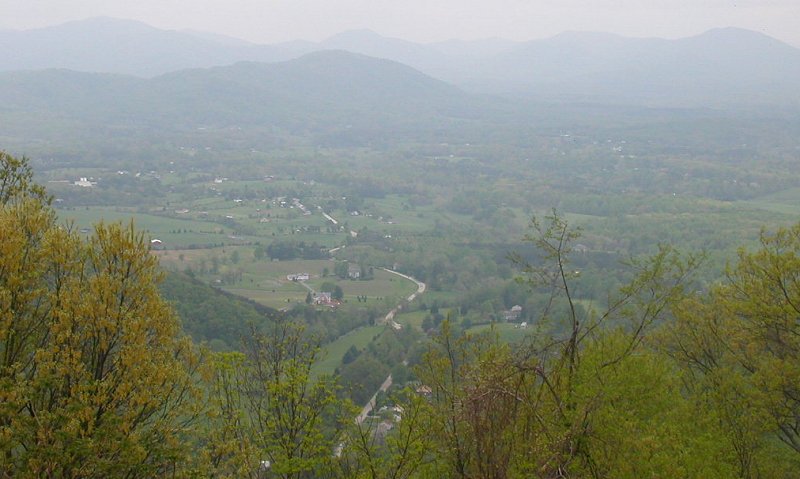
Rockfish Valley - view from scenic overlook on Afton Mountain

Rockfish Valley - view from scenic overlook on Afton Mountain
The ideal event, from a state tourist official's perspective, would probably be a gathering of wealthy business executives who otherwise would not visit the state in person. If a place in Virginia is "special" enough to attract such a group, then the high-powered participants might become familiar with the advantages of locating/expanding a corporation in Virginia.
Government leaders can also go just about anywhere for a meeting - but when national or international groups gather in Williamsburg because the location is uniquely historic as well as convenient, the event showcases Virginia. Such meetings give the Virginia Economic Development Partnership a chance to attract more trade and business opportunities, along with the obvious opportunities for the Virginia Tourism Corporation to market the state's attractions to generate more tourism.
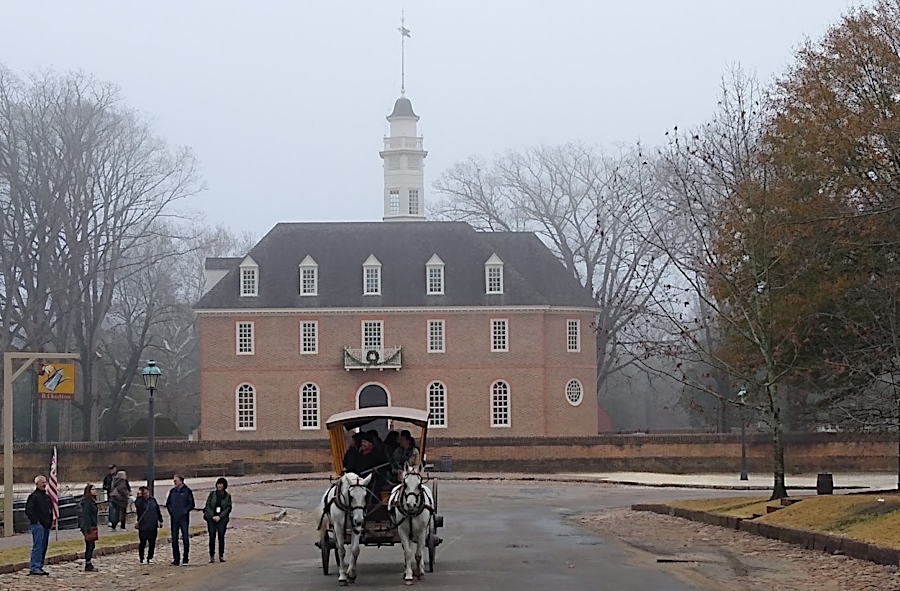
tourism at Colonial Williamsburg is a major economic driver for that area
The core group that tried to attract the 2012 Summer Olympics to Baltimore/Washington included a high percentage of business-oriented managers. It's a major investment to attract the Olympics, requiring far more resources than just the interest of sports fanatics. The business community thought the return on investment from hosting the Olympics would be positive; the committee was not composed of rich dilettantes or starry-eyed idealists enamored by just a love of sports or the romance of the Olympics.
The events that would have been hosted in Virginia (including some proposed for the Fairfax campus of GMU) would have been the less-popular sports. However, the advocates claimed that being associated with the Olympics would provide Northern Virginia with enough gain in long-term business growth to offset the short-term disruption due to traffic and security arrangements.
The Washington/Baltimore bid failed to make the US Olympic Committee cut. New York was the US candidate, but London was chosen as the site for the 2012 Olympics.
Professional sports events also attract a highly-desirable audience. Conversations in sky boxes at athletic facilities may generate more taxes from strategic investment decisions that all the sales of hot dogs, motel rooms, etc. to the thousands of fans in the relatively cheap seats. Both Northern Virginia and Norfolk tried to attract a major league baseball team, before the Montreal Expos were awarded to DC.
Norfolk has the only AAA baseball team in Virginia, the Tide. Richmond has the AA Flying Squirrels, after the AAA Braves-affiliated team moved to Georgia. Other professional teams play in Salem, Danville, Bristol, Pulaski, Lynchburg, Bluefield, and Prince William County. The Prince William team failed to get public funding for a new stadium, so it announced plans in 2018 to move to Fredericksburg.1
Roanoke succeeded in attracting the Dazzle basketball team for the 2001-2002 season. Norfolk encouraged the Charlotte Hornets basketball team to relocate to Tidewater in 2001 - only to see them accept a better deal from New Orleans. Norfolk offers are apparently desired by teams trying to negotiate a better deal from larger cities... but no major teams have seriously planned a move to Tidewater - yet.
Sports events are not the only marketing tool. Conventions that attract high-tech executives to Virginia are highly desirable too. Software developers, system integrators, and other companies whose products are intellectual property rather than widgets can locate almost wherever they want. Usually, the business executives look for a community that provides high "quality of life" values as well as a trained workforce. If a region is a destination for tourists - hey, wouldn't it be a good place to live?
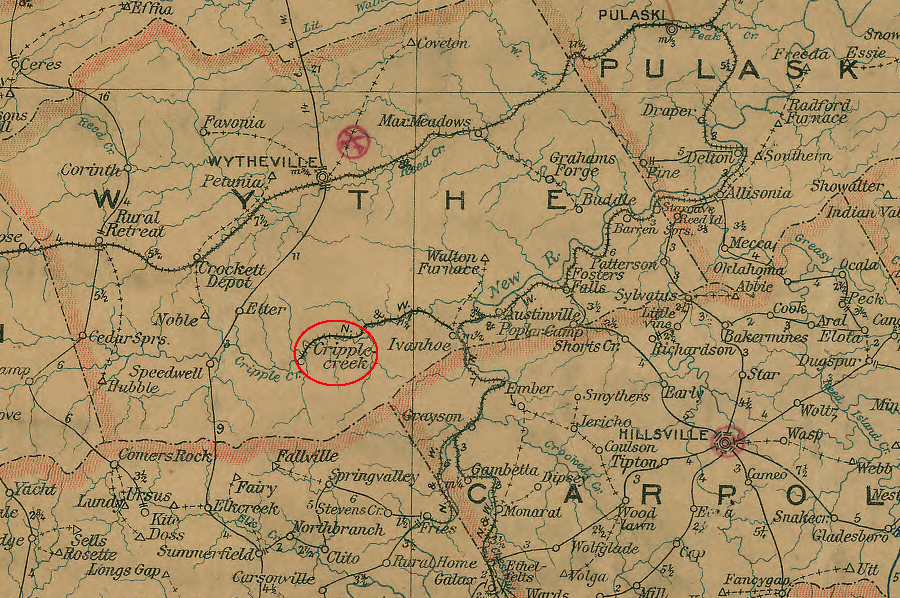
the former railroad hauling mineral ore from Cripple Creek is now the New River Trail State Park, a shared use trail attracting tourists
Source: Library of Congress, Post route map of the states of Virginia and West Virginia
Northern Virginia already has a substantial number of defense contractors, sometimes derisively called "highway helpers" or "Beltway Bandits." They located in the area because the decisionmakers for awarding new and expanded contracts were stationed in the Pentagon or nearby. However, Northern Virginia seeks more than just Defense-oriented businesses. The region also has an attractive climate, excellent airport service, high-quality educational institutions, and attractive neighborhoods with an extensive network of parks.
The challenge is to get Korean, Japanese, European (and New York) decisionmakers to recognize Virginia is a better place to locate a business than Austin, Texas, the Research Triangle Park area in North Carolina, Silicon Valley in California, etc. If Virginia can attract executives of various businesses initially as a tourist or convention attendee, then Virginia has a greater opportunity to convince those executives to locate a factory and create new jobs here.
Northern Virginia is close to Washington DC, which offers world-class tourism opportunities - and Federal business opportunities too. George Mason University has hosted several international "congresses" of information professionals, such as the 2001 Global Internet Summit. GMU was easy for an international audience to reach via Dulles Airport, and the local amenities offered the visiting professionals and their families more than just an auditorium that could handle Powerpoint presentations.
Virginia Tech in Blacksburg has equally-suitable meeting space, and the New River is a stronger tourist attraction than the traffic jams on the Beltway. However, far more international meetings are held in Northern Virginia than in Blacksburg. It is harder to attract international visitors to Blacksburg, because commercial airline service to Roanoke is limited. Tech has a high percentage of international students because it offers an excellent educational experience, but international tourists there are relatively rare.
Some communities focus less on tourism and narrow their marketing to attracting companies that will provide full-time jobs. After all, workers stay for years, students stay for a semester, and tourists stay for just a few days.
Blacksburg and Roanoke market their environment and "livability" to retirees. Retirees to a community stay for a lifetime, and don't send children to schools. As a result, they pay more in taxes than they consume. If the Roanoke/Blacksburg area can attract lots of retirees, the elected officials know there's a better chance of maintaining a low tax rate and keeping the voters happy.
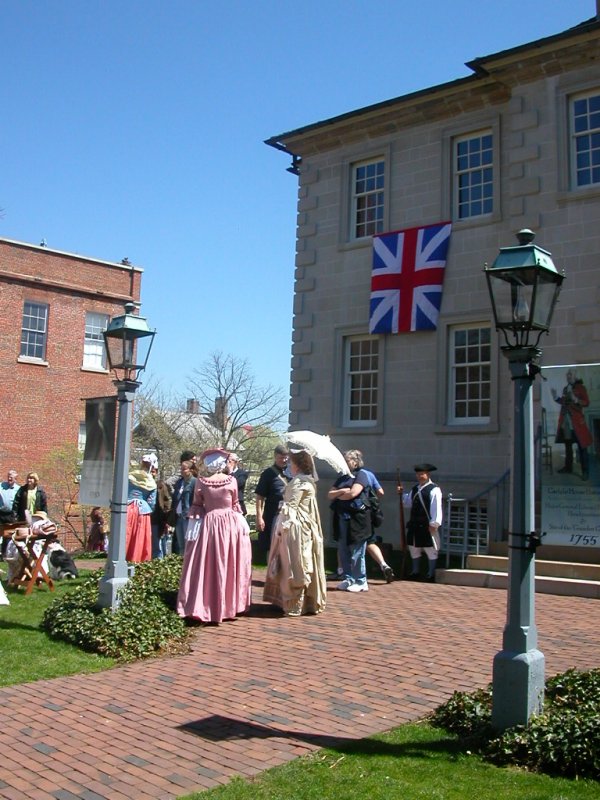
Carlyle House in Alexandria, commemorating 250th anniversary in 2005
of General Braddock's conference with colonial governors in 1755
Sometimes, the investments in tourism are re-evaluated and the state "pulls the plug." In April, 2003, the Aviation Worlds Fair was supposed to come to the Newport News/Williamsburg International Airport. 2003 was the centennial of the first flight by the Wright brothers - and Virginia did not want North Carolina to attract all the business opportunities associated with that event.
The Kitty Hawk sand dunes are miles away, across the state line, but Virginia planned to host "The Most Comprehensive Global Aviation Event Ever Held." It was projected to be a 21 day event, with the first 5 days dedicated to a giant trade show. However, the Commonwealth of Virginia and the City of Newport News cancelled plans to support the event with public funding in October, 2002.
The state budget crunch required cutting funding in many areas, and public support for the Aviation Worlds Fair was one of the casualties. Dayton, Ohio proceeded to hold a 17-day celebration in 2003, but its "Inventing Flight" event ended up $5 million in debt.2
The 150th anniversary of the Civil War offered Virginia another opportunity to host events designed to attract tourists. The target audience for "anniversary" events is not the residents who live near the location. People who have access to their own kitchens and beds may buy admission tickets and souvenirs, but they purchase little else.
Economic impacts are generated by:3
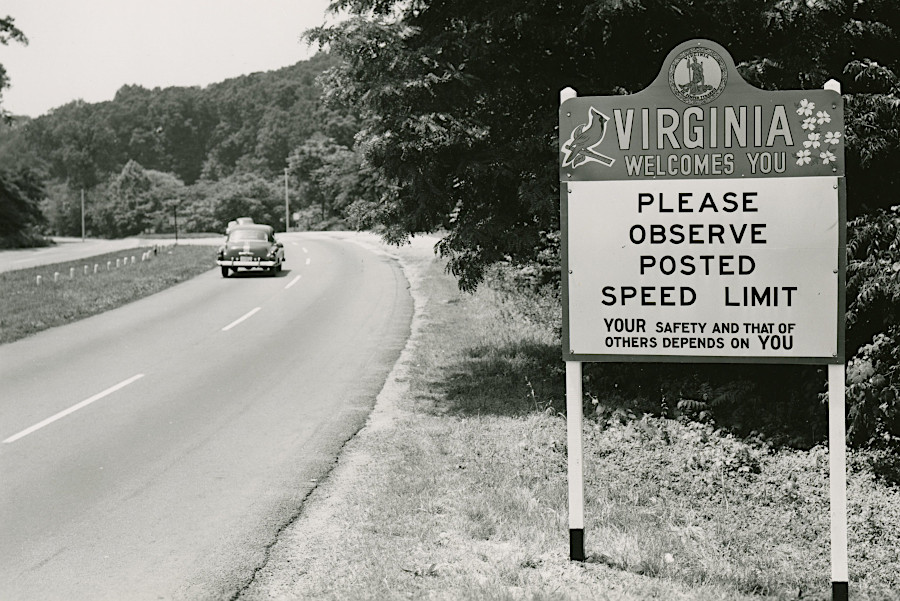
welcome sign on Arlington Boulevard (U.S. 50) just west of Arlington Ridge Road (Arlington County)
Source: National Archives, Virginia Welcome Sign (June 4, 1953)
Visitors from at least 50 miles away are more likely to stimulate the local economy (and generate tax revenue) by spending money at restaurants and renting motel rooms. The Crooked Road in Southwestern Virginia was designed to attract people to musical events as well as places that require just a short "hop out of the car" stay.
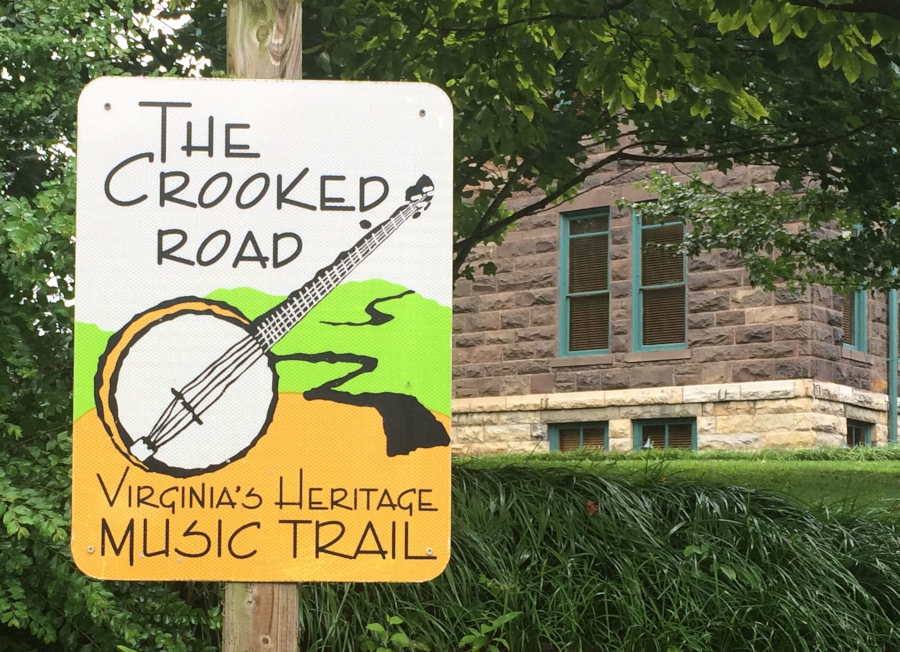
Big Stone Gap has a wayside exhibit highlighting the musical heritage of the coalfields
Calculating the return on investment for public expenses related to tourism is challenging. Costs are easy to identify, but benefits of the event are spread across multiple sectors of the economy. The simplest math is to contrast a government's appropriation with the increase in tax revenue, especially sales taxes/meals taxes/motel taxes. However, income taxes may also increase as a result of additional business activity related to an event.
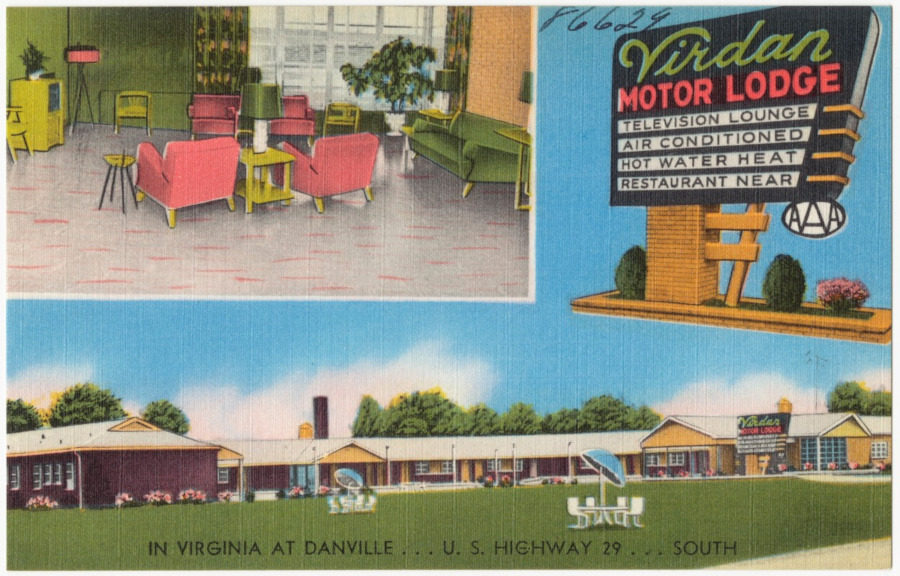
the business of tourism expanded as cars became affordable and Virginia built paved highways
Source: Boston Public Library, Tichnor Brothers Postcard Collection, Virdan Motor Lodge, in Virginia at Danville... U.S. Highway 29... South
Hardest to quantify are the long-term marketing advantages from getting people to think about visiting the location for future vacations. For example, the 2007 events at Jamestown to commemorate the 400th anniversary of English colonization were followed by the 2008 recession, so "mind share" may not be converted into actual visits with actual revenue in the future.
State and local officials in Virginia invested heavily to stimulate tourism associated with the 150th ("Sesquicentennial") anniversary of the Civil War, and planning started in 2006 for events five years later. The Virginia Sesquicentennial of the American Civil War Commission defined four goals the events: diversity (events must be "inclusive of, and meaningful to, all Virginians"), inclusiveness ("portray a fair and balanced story of Virginia's participation in the American Civil War that includes African-American, Union, and Confederate perspectives"), education ("to ignite a renewed interest in Virginia's historical heritage") and permanence (to "leave a positive and rich legacy well beyond 2015").4
However, in Prince William County (site of the first major battle in 1861 at Manassas) the essential link between tourism funding and increased economic activity was made very clear:5
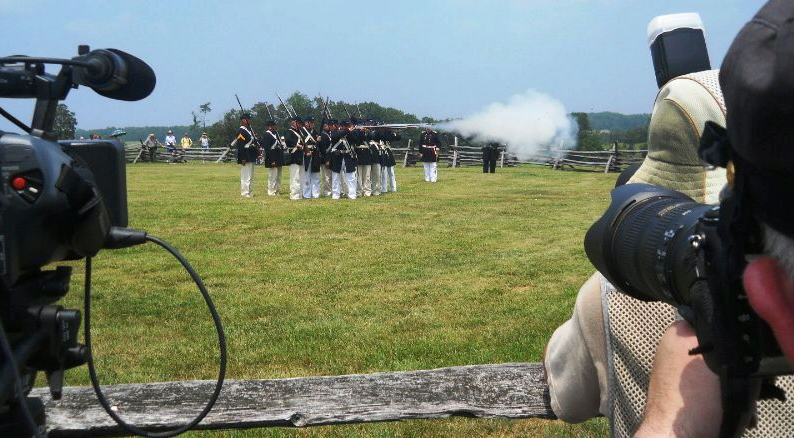
musket firing at 2011 re-enactment of First Manassas battle
Source: State Department
In 2012, the Virginia Association of Convention and Visitors Bureaus honored the 150th commemoration of the Battle of First Manassas/Bull Run as the "Destination Event of the Year for 2011." In its announcement of that award, the local tourism marketing agency claimed the four days of Sesquicentennial events in July, 2011 had attracted 30,000 visitors and "generated an estimated $20 million in direct visitor economic impact" in the local area.6
The City of Manassas assessment of the economic benefits vs. taxpayer costs are more revealing, and acknowledge revenues were lower than expected. The city spent over $625,000 to support the Sesquicentennial. Costs included:7
The excessive heat (up to 105 degrees) during the Sesquicentennial was cited as a major reason for low revenues. Any business-based analysis of risk associated with an outdoor event in July would have accounted for bad weather - but when it comes to tourism, governments do not operate like a business.
Subsidizing tourism with tax dollars is often justified as a means to increase revenue, but the benefit-cost calculations may be different. As the mayor of Manassas put it, "There is no one else that could have done what we did." Partisan status is not a useful guide when assessing if a government will subsidize tourism - the Manassas City Council that invested in the Sesquicentennial events was composed of six Republicans and one Independent.
The Sesquicentennial events were concentrated in July 2011, so increased tax revenues that might be associated with increased tourism could be estimated by comparing July 2010 tax collections with July 2011. Manassas collected less than $50,000 in increased taxes in 2011 - less than 10% of its investment - but also calculated $240,800 in "publicity value" from the broadcast coverage (and additional value from print, radio and internet reports).
The city concluded:8
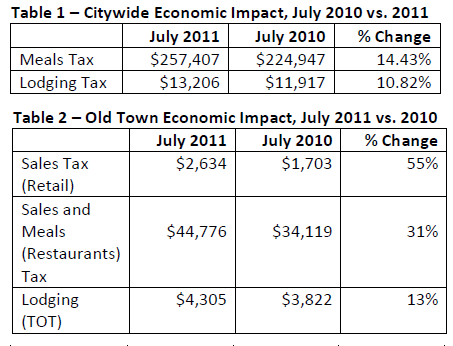
increased tax revenues in Manassas, for 2011 sesquicentennial vs. previous year
Source: An Analysis of the City of Manassas Participation in the Sesquicentennial of the Battle of First Manassas, July 21 - 24, 2011
The 150th anniversary of Second Manassas in 2012 was a low-key event, without substantial public funding to support one-time events designed to increase tourism. Instead, the National Park Service offered a series of historical tours, led by interpretive rangers on the battlefield.
In 2013, Spotsylvania County recovered 2/3 of the $187,000 it spent for a re-enactment of the 1863 Battle of Chancellorsville, through ticket sales, merchandise sales, and re-enactor registration fees. In 2014, the county spent $160,000 on re-enactments of the 1864 battles of Wilderness and Spotsylvania Court House, and recovered almost 90% of that cost immediately. In addition, the tourism officials expected additional long-term benefits through attracting future tourists, and from advertising Spotsylvania County to attract more businesses to locate in the area.9

during the 150th anniversary sesquicentennial of the Civil War, Spotsylvania County spent less than Manassas to attract tourism, and recovered a higher percentage of the costs
Source: Spotsylvania County Visitor Center, Spotsylvania, Virginia: Crossroads of the Civil War
While the economic benefits of major events are questionable, business leaders in the Washington DC area still chose in 2013 to bid for the 2024 Summer Olympics. That bid dropped the 2012 regional partnership with Baltimore and proposed holding more events within DC, but left open the possibility of hosting some Olympic activities in Northern Virginia.
The president of the Greater Washington Sports Alliance predicted a successful bid would end up requiring $4-6 billion to fund new infrastructure and the operating costs of the actual event. While there is the potential for a positive return on investment, especially if the long-term benefits of urban redevelopment to create an Olympic Village and other facilities are considered, there is also the potential for an Olympics to end up with negative economic benefits. In 2012, London saw a decrease in international tourism because the warnings about Olympic-sized crowds and Olympic-sized costs caused visitors to avoid the city.10
The Commonwealth of Virginia Tourism Development Financing Program provides tax incentives to encourage businesses, such as hotels and restaurants, to locate in specific areas planned for tourism-related development. Cities/towns/counties that establish tourism zones and get a tourism development plan approved by the Virginia Tourism Corporation can get tax rebates, which developers can use to finance specific projects.
The state will direct 1% of the sales tax generated by specific projects in tourism zones to finance the last 20% of borrowing costs. The developer must fund the first 80% from other sources before Virginia will authorize tax rebates for "close the gap" funding, and the locality and the developer must match the state's contribution.11
In addition to the state requirements, each jurisdiction with a tourism development zone can establish performance criteria for projects within the zone to qualify for tax rebates. Fredericksburg requires less investment, and creation of fewer jobs, in the zone designed to draw tourism-related businesses to downtown. Buildings are small there, and opportunities are limited. Developers seeking local support for projects in the Eagle Village and the Celebrate Virginia South - Central Park zones, where large undeveloped lots are available, must commit to investing greater amounts and creating more jobs.12
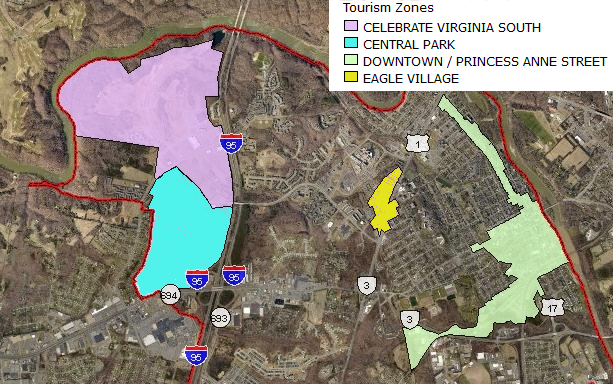
Fredericksburg has designated Tourism Development Zones to qualify for state tax incentives and attract more investment
Source: Fred GIS (Fredericksburg Geographic Information System)
Virginia Beach has proposed using $25 million in public funds to support construction of a new concrete replacement for the iconic fishing pier at 15th Street. The current wooden structure was built in 1950. It has been repaired after major storms, but by 2015 the bait sales and retail outlets on the pier generated little tax revenue. The pier franchise payment generated just $20,000 annually for the city.
Starting in 2015, the City of Virginia Beach began considering a series of proposals for replacing the pier. The goal was to spur redevelopment of private property near the pier, increasing employment and generating more tax revenue. The city government offered to consider new land use authorizations as well as contribute funding for construction of a new parking structure and a concrete pier.13
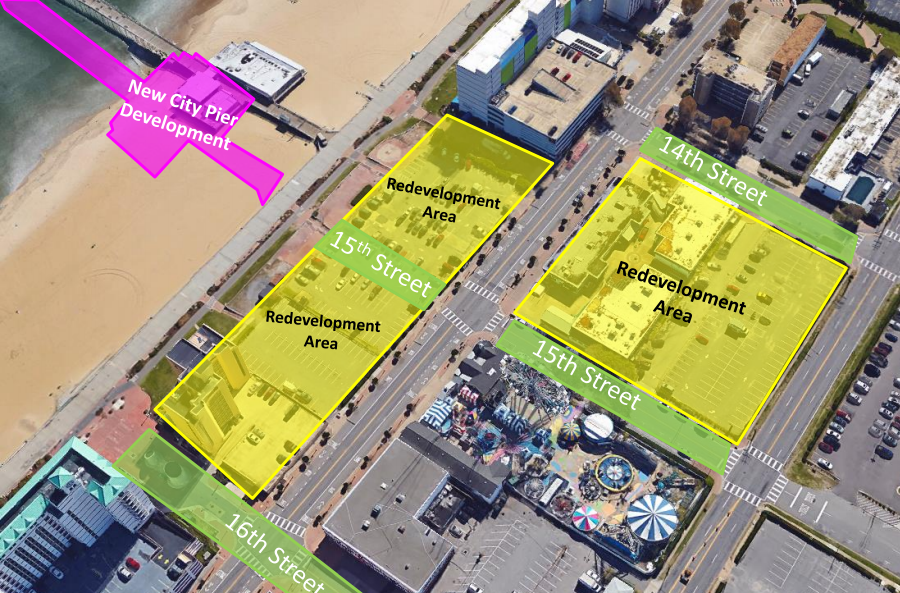
proposals to replace the Virginia Beach Fishing Pier included redeveloping land along the Oceanfront
Source: City of Virginia Beach, 15th Street Pier Proposal
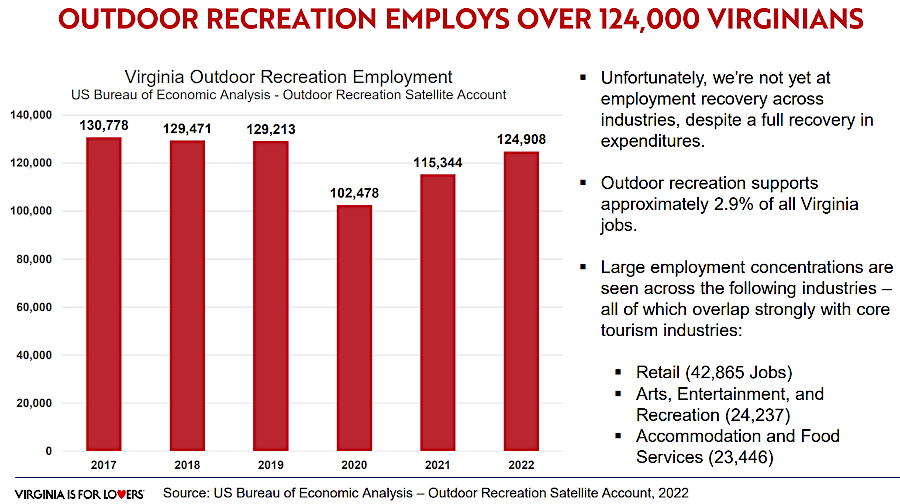
businesses hire workers to help tourists boat, hike, bike, and play outdoors in Virginia
Source: Virginia Tourism, The Economic Impact of Outdoor Recreation in Virginia
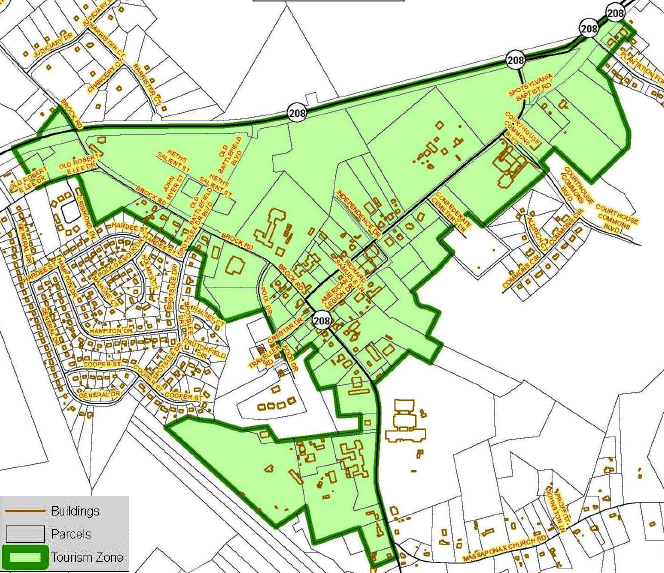
one of the Tourism Development Zones designated in Spotsylvania County is at the courthouse
Source: Spotsylvania County, Tourism Zone Program
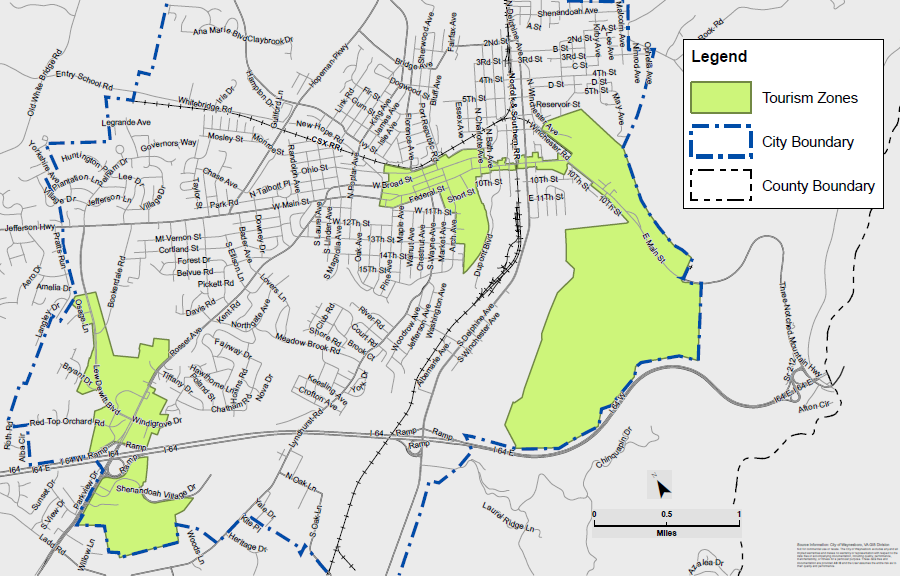
Waynesboro designated its Tourism Development Zone in 2013
Source: City of Waynesboro, Tourism Development Zone
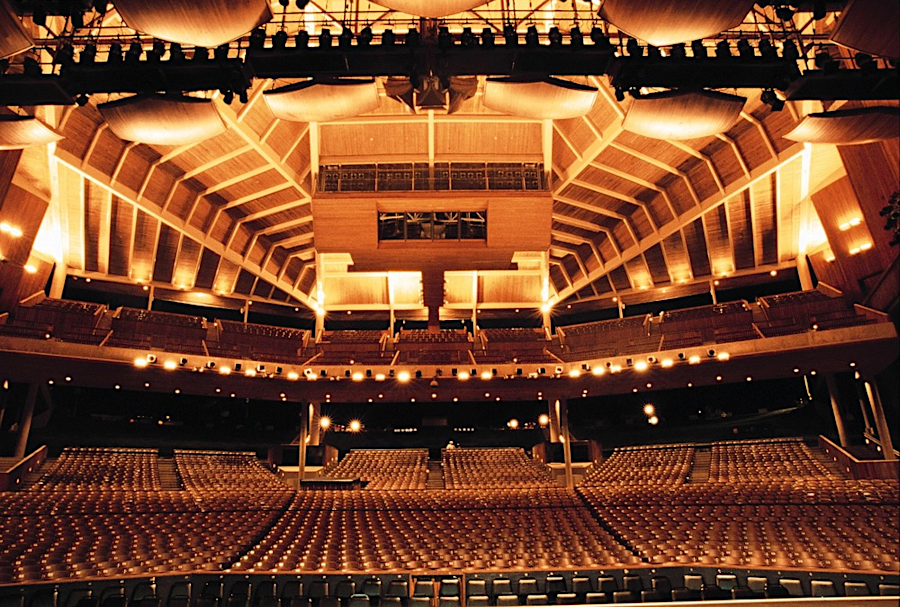
the Wolf Trap National Park helps to boost tourism in Fairfax County
Source: City of Waynesboro, Wolf Trap's Filene Center